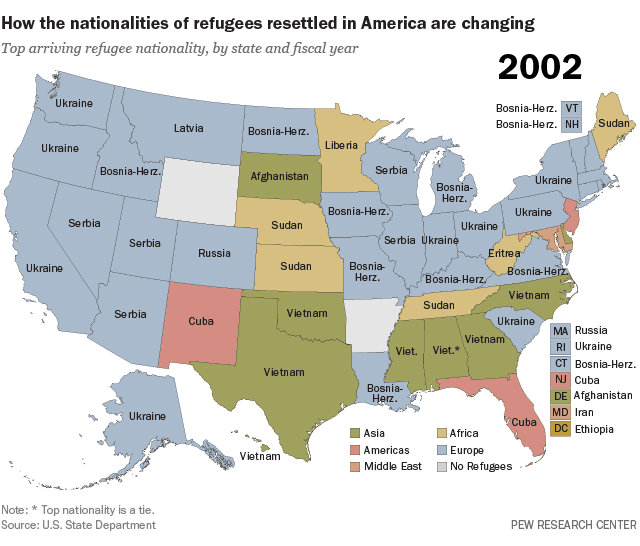Even the LATimes calls for the program to be ended. In part: Sayfullo Saipov, who allegedly killed eight and wounded 11 in a truck attack on Tuesday, entered the country from Uzbekistan through the diversity visa lottery. He is not the first presumed terrorist to enter using the program. Lottery terrorists include Hesham Mohamed Ali Hedayet, who shot up an El-Al ticket counter in 2002, killing two, and Imran Mandhai, who planned to bomb power stations in Florida the same year.
The chilling details on Imran Mandhai are located here.
National security problems with the lottery have long been known. At a 2003 congressional hearing, the inspector general of the State Department, which oversees the lottery, testified that the program “contains significant risks to national security from hostile intelligence officers, criminals and terrorists attempting to use the program for entry into the United States as permanent residents.”
The concerns identified at that hearing 14 years ago remain. In 2016, Immigration and Customs Enforcement created a list of countries that “promote, produce, or protect terrorist organizations or their members.” Of the top 10 source countries for lottery winners in 2016, four were on ICE’s list: Egypt (No. 2), Iran (No. 3), Uzbekistan (No. 5) and Sudan (No. 7). Many other countries on the ICE list also send significant numbers of lottery winners.
In 2015, 14.4 million individuals plus family members successfully registered for the annual drawing. The State Department has to weed out those who do not qualify. After a computer randomly selects 100,000 names. State Department employees interview and vet the finalists, whittling down the list to the 50,000 cap. This is no simple task, since most applicants come from countries where recordkeeping is spotty and documents are hard to verify. Screening for visa lottery fraud takes up valuable State Department resources that could be allocated elsewhere if the program did not exist.
*** Suddenly, Chucky Schumer is suddenly quiet or forgets some facts.
The program was created by the late-Senator Ted Kennedy in the early 1990s, with help from then-Rep. Chuck Schumer, now the Senate Minority Leader, as a way to open the door to more Irish immigrants who could not qualify for immigration opportunities because of our equally nonsensical family chain migration policy. Of course, Schumer (and Kennedy until his death), continues to this day to defend family chain migration, and is fighting efforts to adopt a merit-based immigration policy that would obviate the need for the annual Wheel of Fortune exercise. More here.
Included in the lottery are all four countries the U.S considers state sponsors of terror — Iran, Sudan, Cuba, and Syria — and 13 of the 14 nations that are coming under special monitoring from the Transportation Security Administration as founts of terrorism. Pakistan is excluded because, like China, it sends over tens of thousands of immigrants each year and doesn’t need to be in the lottery.
Among the winners for 2010 are:
Nigeria: 6,006
Iran: 2,773
Algeria: 1,957
Sudan: 1,084
Afghanistan: 345
Cuba: 298
Somalia: 229
Lebanon: 181
Libya: 152
Iraq: 142
Saudi Arabia: 104
Syria: 98
Yemen: 72The State Department’s Office of the Inspector General recommended in a 2003 report that terror-sponsoring nations be removed from the diversity visa program.
“OIG believes that this program contains significant vulnerabilities to national security as hostile intelligence officers, criminals and terrorists attempt to use it to enter the United States as permanent residents,” the office’s deputy inspector testified to Congress in 2004.
A separate report filed by the Government Accountability Office also faulted the program for being susceptible to widespread fraud. A cottage industry has emerged abroad to cater to the lottery, and it regularly bilks people out of massive amounts of money and even coerces some into marriage to keep their diversity visas. More here.
Meanwhile:
The resettlement of refugees in the U.S. has been fairly consistent across the country since 2002, with no state resettling a majority of them. In fiscal year 2017, no state resettled more than 10% of the 53,716 refugees the nation admitted that year. California, Texas, New York, Washington, Michigan and Ohio each accounted for at least 5% of refugees resettled, while all other states had a lower share. In fiscal 2002, the earliest year state-level data are publicly available, California resettled 16% of the nation’s 27,110 refugees, the only state to account for more than 15% of the nation’s total that year – or in any following year, according to a Pew Research Center analysis of U.S. State Department data.
Most refugees today come from the Middle East and Africa, but this has not always been the case. Check more details here.







